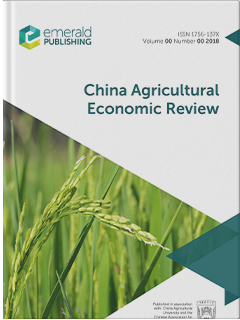Comparing the determinants of household carbon footprints between rural and urban: evidence from China household survey data
IF 4.4
2区 经济学
Q1 AGRICULTURAL ECONOMICS & POLICY
引用次数: 0
Abstract
PurposeUrbanization is driving the growth of China’s carbon footprint. It’s important to investigate what factors, how and to what extent, affect carbon footprints embedded in various categories of rural and urban households’ consumption.Design/methodology/approachWe employ an environmental extended input-output model to assess and compare the rural-urban household carbon footprints and perform a multivariant regression analysis to identify the varying relationships of the determinants on rural and urban household carbon footprints based on the panel data of Chinese households from 2012 to 2018.FindingsThe results show evidence of urbanity density effect on direct carbon footprints and countervailing effect on indirect carbon footprints. The old dependency ratio has no significant effect on rural family emissions but has a significantly negative effect on urban direct and indirect carbon footprints. A higher child dependency ratio is associated with less rural household carbon emissions while the opposite is true for urban households. Taking advantage of recycled fuel saves direct carbon emissions and this green lifestyle benefits urban households more by saving more carbon emissions. There is a positive relationship between consumption structure ratio and direct carbon footprints while a negative relationship with indirect carbon footprints and this impact is less significant for urban households. The higher the price level of water, electricity and fuel, the lower the rural household’s direct carbon footprints. Private car ownership consistently augments household carbon footprints across rural and urban areas.Originality/valueThis paper provides comprehensive findings to understand the relationships between an array of determinants and China’s rural-urban carbon emissions, empowering China’s contribution to the global effort on climate mitigation.比较城乡家庭碳足迹的决定因素:来自中国住户调查数据的证据
目的城市化正在推动中国碳足迹的增长。研究哪些因素、如何以及在多大程度上影响着城乡家庭各类消费中的碳足迹具有重要意义。设计/方法/途径我们采用环境扩展投入产出模型来评估和比较城乡家庭碳足迹,并基于2012-2018年中国家庭面板数据进行多元回归分析,以识别城乡家庭碳足迹决定因素的不同关系。结果结果显示,城市密度对直接碳足迹有影响,对间接碳足迹有反作用。老年抚养比对农村家庭碳排放无显著影响,但对城市直接和间接碳足迹有显著负向影响。抚养子女比率越高,农村家庭碳排放量越少,而城市家庭则相反。利用回收燃料可以节省直接碳排放,这种绿色生活方式通过节省更多的碳排放使城市家庭受益更多。消费结构比率与直接碳足迹呈正相关,而与间接碳足迹呈负相关,但对城市家庭的影响较小。水、电和燃料的价格水平越高,农村家庭的直接碳足迹就越低。本文提供了全面的研究结果,以了解一系列决定因素与中国城乡碳排放之间的关系,从而增强中国对全球气候减缓努力的贡献。
本文章由计算机程序翻译,如有差异,请以英文原文为准。
求助全文
约1分钟内获得全文
求助全文
来源期刊

China Agricultural Economic Review
AGRICULTURAL ECONOMICS & POLICY-
CiteScore
9.80
自引率
5.90%
发文量
41
审稿时长
>12 weeks
期刊介绍:
Published in association with China Agricultural University and the Chinese Association for Agricultural Economics, China Agricultural Economic Review publishes academic writings by international scholars, and particularly encourages empirical work that can be replicated and extended by others; and research articles that employ econometric and statistical hypothesis testing, optimization and simulation models. The journal aims to publish research which can be applied to China’s agricultural and rural policy-making process, the development of the agricultural economics discipline and to developing countries hoping to learn from China’s agricultural and rural development.
 求助内容:
求助内容: 应助结果提醒方式:
应助结果提醒方式:


